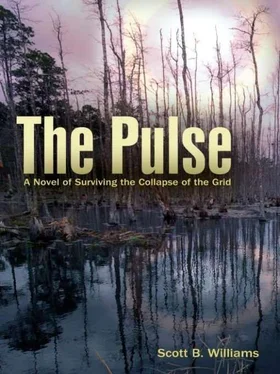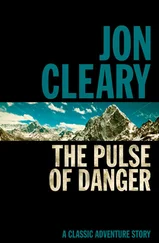“But so much of their surveillance relies on high-tech electronics. I don’t see how they can seal off the coast like they did after 9-11. And even if they do, we’re both American citizens. They would have to let us in, wouldn’t they?”
“One would think so, but Scully doesn’t have a U.S. passport. He’s from Jamaica, but now his official citizenship is in Grenada. That could be a problem, but as you can see, we need him more than ever now. I’m gonna be pretty useless for a while with this bum arm.”
“All I know is that I’m getting in , one way or the other. I’m going to find Casey in New Orleans and get her out of there, but I don’t know what we can do after that.”
“I don’t know either, Doc. I’m just glad we’ve got the boat. I think we ought to sail somewhere pretty remote and lay low for a while after we leave there. Anywhere near New Orleans is not gonna be the place to be, Florida either, or just about anywhere in the Gulf, except maybe a few stretches of the Mexican coast on the north side of the Yucatán. Wherever we go, it needs to be some place with good, protected anchorage for the boat, a fresh water supply, and good fishing and foraging. I’ve got a feeling we’re gonna have to be self-sufficient for a while. I just can’t even contemplate what a mess it’s going to be up there in the bigger cities if this goes on for a few months.”
“But don’t you think everyone is going to have the same idea about getting out of the cities? It looks like there would be a mass exodus from just about all of them. I mean, everybody knows that food comes from the country, even city people. Won’t they head out any way they can and try to get to farms hoping to find something to eat? I guess that’s what I would do, if I were in that situation with no other choice.”
“Nah, some will, but you gotta remember, most people are conditioned to expect a government handout when some disaster strikes, like a hurricane, for instance. I think most of them will hang around hoping help is on the way until they finally realize it ain’t coming. Besides, from what I’ve seen my last few times in the States, most people these days aren’t in shape to walk out of their neighborhoods, much less far enough to get to the rural areas. And even though some could do something like that, far fewer have access to good, seaworthy boats that could reach the kinds of places I’ve got in mind. No, Doc, we don’t have to worry about that. As long as some other freak of nature doesn’t come along and shut down the wind, the world is our oyster here aboard the Casey Nicole. ”
“I just hope we get there before Casey decides to leave,” Artie said, suddenly worried about this new possibility. “If she were to evacuate or something before we get there, I don’t know how I would ever find her.”
“We’re gonna find her, Doc. Just try not to worry too much about all the what-ifs. Just help Scully sail this boat and when we get there we’ll figure it out one step at a time.”
CASEY GLANCED OVER her shoulder one last time at the terrible place on the Interstate where a dead man was sprawled face down on the concrete slab. She shuddered to see that at least a dozen of the big black vultures they had disturbed in their passing had returned to swarm over the body, while more circled downward, gliding in for the feast in lazy, spiraling loops. Casey looked ahead with apprehension for signs of more winged scavengers, as Grant had said it was inevitable that they would pass more dead bodies, but, at least for now, she didn’t see any.
By the time they reached the exit to Causeway Boulevard, where they would get off the expressway to turn north, the mid-afternoon sun was baking the hot concrete beneath their tires. New Orleans’s heat and humidity, even in March, could sap the strength of the fittest athlete. Sweat dripped on her handlebars as she rode, and her quadriceps burned from spinning the cranks. Jessica was struggling even more than she was, while Grant made it look effortless.
“I don’t think I can go much farther without resting,” she said, as they coasted down the ramp at their exit.
“It’s only a little over two miles from here to the start of the Causeway Bridge,” Grant said. “If you can just try to push on that far, we’ll stop there and take a real break before we start the crossing. We need to eat something to keep our energy up, but I’ll feel a lot better if we don’t stop until we’re on the bridge.”
Causeway Boulevard, like every other road they had seen in the city, was packed with stalled cars and trucks, but in the short ride north to the start of the bridge, they had to move out of the way several times to make room for the occasional running vehicle as well. Most of these were pickup trucks, station wagons, or sedans twenty years old or more. Without exception, all were bound north, out of the city, most jam-packed with families and as many of their belongings as they could pile in the back or lash onto the roof. All of them faced a 24-mile-long obstacle course of more stalled vehicles blocking the bridge, but Grant said that by now people had probably pushed enough cars to one side or the other to open a route. Most of those few lucky enough to be riding in motor vehicles were focused on the obstructions ahead of them and hardly gave Casey, Grant, and Jessica a second glance. While a lone traveler without much stuff might have had some chance of hitching a ride, no one was going to stop for three people loaded down with gear. There were other bicyclists riding out of the city too, as well as a few people walking with large backpacks or duffel bags slung over their shoulders. The refugees moving north that first day were the vanguard of what would surely become an exodus from the city when more of the population of the greater New Orleans area figured out that help was not coming. Grant said it would probably be several days before many people accepted that reality and decided that their survival was up to them, and even those who realized the truth would likely hesitate due to indecision until it was too late.
“I’ve never seen anything like this in my life,” Jessica said, “except in a movie or something. This is just unreal.”
“It’s sort of like a hurricane evacuation, but without the traffic jams. You should have seen what it was like here just before Katrina hit. Every road north was backed up bumper-to-bumper for a hundred miles. It was that way all the way across Louisiana to Mississippi and Alabama. But the big difference was that the cars were running. Everyone who had access to a vehicle and any common sense at all got out and got out early.”
“But they also had someplace to go, right?” Casey asked. “I mean, all they had to do was drive far enough inland from the Gulf to get out of the danger zone. Where will all these people who are leaving go if the power is out everywhere? I don’t imagine most of them have a cabin like yours to go to.”
“No, but a lot of them may have relatives or friends nearby. Maybe they think everything will be normal somewhere else within reach, or at least they can hope. But they’re making the right choice to get out of New Orleans while they can.”
“Don’t you think there will be someone willing to help all these people, like there are when hurricanes hit?” Jessica asked. “Surely there will be some somewhere.”
“It’s possible, but we just don’t know the scale of this. If it’s as bad as the worst-case scenario, I just can’t imagine how anyone could do much, no matter how much they may want to. I think you’ll see small groups of neighbors joining together to help each other, especially in the smaller towns and rural areas to the north of the city. But I don’t see how they can do much to help a bunch of outsiders flooding in with nothing to eat. I’m just glad we have what we need with us and a place to go so we don’t have to depend on anyone’s generosity, because it will probably be in short supply.”
Читать дальше












